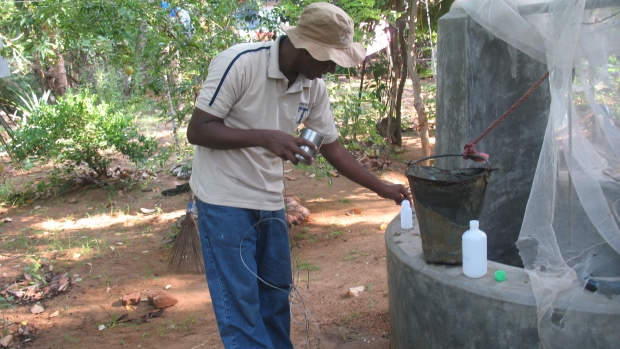Grants :: Small Grant Facilities :: Investigating groundwater quality in Panama
Investigating groundwater quality in Panama

Testing water samples from drinking wells in Panama., Panama, Sri Lanka © Kumudini Ekaratne IUCN, 2011
Objectives
- Investigating how anthropogenic pollutants, originating from different land use patterns, are transported to and affect sandy coastal aquifers.
- Ultimately developing management actions to alleviate the contamination of groundwater resources in areas these resources are highly vulnerable.
Background
Groundwater contained in aquifers (water containing porous rocks that can be extracted for use) in coastal areas of Sri Lanka is very valuable, but is also extremely vulnerable to pollution, especially in areas near lagoons or bordering the sea, where the porosity of soil is high.
In various coastal areas in Sri Lanka – particularly in the dry and arid zones – water resources are critical for livelihoods and for the local economy. Careful management of groundwater, therefore, becomes vital for development.
The Panama Lagoon area, located in the southeastern part of the island, is an important agricultural area where paddy and cash crop cultivation is widespread. For the last few decades, surface water (water that collects on the surface) has been the main water supply for the region. However, water demands have since increased as a result of a growing population and an increasing demand for domestic and agricultural activities. After the civil unrest, there has also been rapid development in the area. The result is that groundwater is now being used increasingly as the main source of water in the area.
Increasing the extraction of groundwater can lead to the drying up of shallow wells (as local communities are now reporting) and the influx of salt water, while the expansion of agriculture – with excessive use of fertilisers – can result in the pollution of these aquifers. The overall result is the degradation of groundwater.
Despite the importance of groundwater in this area, there is no knowledge about natural process that balance the chemical composition of groundwater or which human activities contaminate it. In order to promote sustainable use of groundwater resources in the area, an increased knowledge of the geochemical characteristics of groundwater is essential.
Target beneficiaries
Villagers in Panama, Helawa and Okanda.
Outputs
- Ground water strategy which could be implemented by the national or local institutions.
- Map of sampling sites in relation to land use and population distribution.
Accomplishments and challenges
-
There is a high concentration of sodium, potassium, calcium, magnesium nitrates and phosphates in the groundwater. High sodium indicates that there is salt water intrusion. Other chemicals – particularly different kinds of nitrogen as well as phosphorous – indicate pollution from anthropogenic and agricultural sources as they are key components of fertilisers.
-
Pit latrines constructed in the loose soil and irresponsible waste disposal also contribute nitrates into the groundwater.
-
GIS-based water quality distribution maps identifying areas of high vulnerability have been prepared, forming the basis for planning and control of groundwater use in the area and for spatial and statistical analyses of existing groundwater contamination.
Contributions to cross-cutting themes
The study which is the first in the Panama lagoon has provided baseline data which could be used to access the future changes due to climatic and non-climatic changes in the study area.
Lessons Learned
- Reliable and regular data is invaluable to guide improved performance
- Raised awareness and prioritization regarding water quality management across the region is critical to improved performance
Project Facts
Country
Location
Panama, Sri Lanka
Topic
Duration
1st May 2011 to 30th Apr 2012
MFF Grant Amount
LKR 481,976. 00